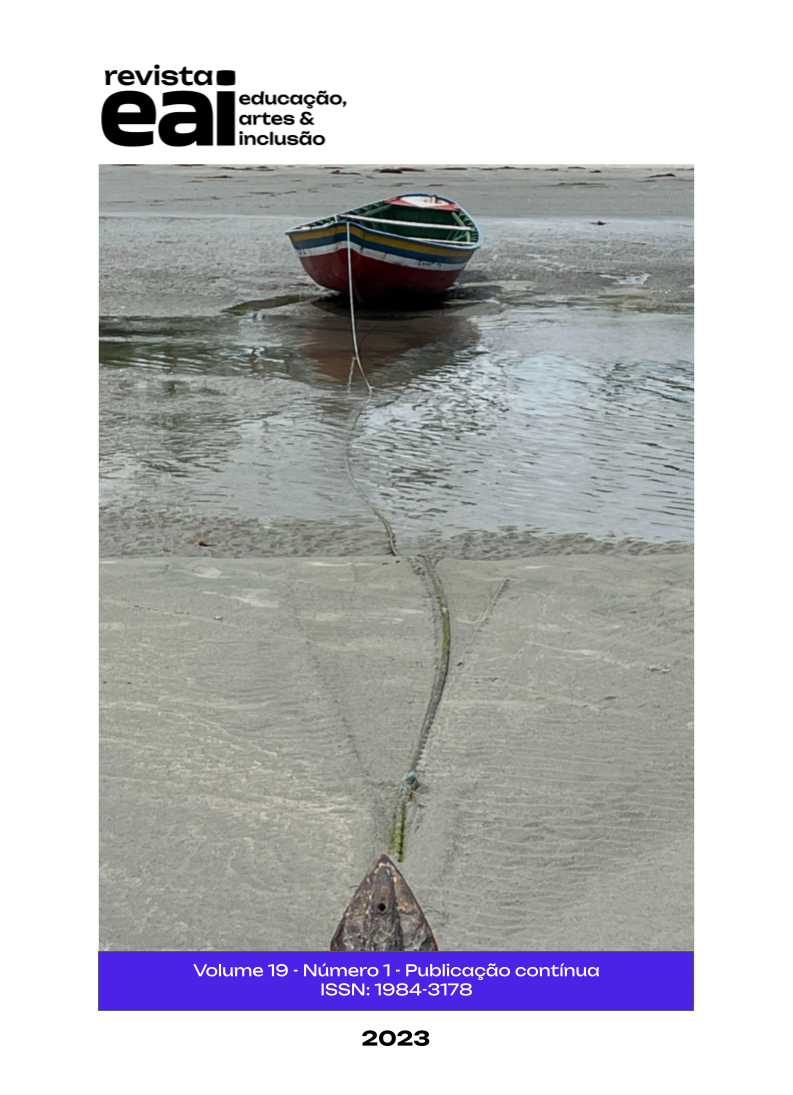The role of school in constituting the identity of the person with disabilities
DOI:
https://doi.org/10.5965/198431781820231e0043Keywords:
people with disability, school, identity, inclusionAbstract
This study analyzed the role that the school has in constituting the identity of people with disabilities, pointing out its possibilities and limits. To accomplish these purposes, the study addresses the concept of disability produced from the 19th century onwards, from the discussions of authors such as Foucault, Vigotski, Skliar and others, who understand disability as a social construction, defined from the established relationships in the sociocultural context. In addition to the theoretical study, a field research was also carried out, through a narrative interview with to women with disabilities, one graduated in Psychology, and the other in Psychology. The results showed that the school has an important role in the constitution of the identity of people with disabilities, as this one of the most significant social groups that the subjects integrate throughout their lives. It can either contribute to the constitution of an autonomous and confident subject, who realizes its power, as it can constitute insecure people who perceive themselves as deformed/ wrong. In this matter, school can either welcome people in their subjectivity, or exclude them from their formative processes.
Downloads
References
ALTERIDADE. In Dicionário online Michaelis. São Paulo: Ed. Melhoramentos, 2020. Disponível em: https://michaelis.uol.com.br/moderno-portugues/busca/portugues-brasileiro/alteridade/. Acesso em: 12 abr. 2020.
ALTERIDADE. In: Dicionário online – significados. Porto: 7graus, 2019. Disponível em: . Acesso em: 12 abr. 2020.
CAIADO, Katia Regina Moreno. Aluno com deficiência visual na escola: lembranças e depoimentos. 3 ed. Campinas, SP: Autores associados, 2014. 148 p.
CANIATO, Angela Maria Pires. A subjetividade na contemporaneidade: da estandartização dos indivíduos ao personalismo narcísico. SILVEIRA, AF., et al., org. Cidadania e participação social [online]. Rio de Janeiro: Centro Edelstein de Pesquisas Sociais, 2008. pp. 5-22. Disponível em: http://books.scielo.org/id/hn3q6. Acesso em: 6 mar. 2020.
FORMOZO, Daniele de Paula. Currículo e educação dos surdos. 2008. Dissertação (Mestrado em Educação) – Universidade Federal de Pelotas, Pelotas, 2008. Disponível em: https://repositorio.ufsc.br/handle/123456789/188280. Acesso em: 18 jun. 2020.
FOUCAULT, Michel. Vigiar e punir: nascimento da prisão. Ed. 42. Petrópolis, Rio de Janeiro: Vozes, 2014. 302 p.
GOFFMAN, Erving. Manicômios, prisões e conventos. São Paulo: Editora Perspectiva. 1961. 316 p. Disponível em: https://app.uff.br/slab/uploads/Manicomios-prisoes-e-conventos.pdf. Acesso em: 13 jun. 2020.
HALL, Stuart. A identidade cultural na pós-modernidade. 5 ed. Rio de Janeiro: DP&A, 2001. 102 p.
LOCKMAN, Kamila; KLEIN, Madalena; HENNING, Paula. Educação inclusiva: dispositivo de normalização da alteridade surda. Cadernos de Educação, Pelotas, n. 31, p. 249-267. Jul-dez. de 2008. Disponível em: https://pdfs.semanticscholar.org/c20c/bb6ee254dba1fd1d34814ccecbf737db63c6.pdf?_ga=2.17813817.1252132892.1592066244-1204632416.1592066244. Acesso em: 13 jun. 2020
ROSSETO, Elisabeth. Sujeitos com deficiência no ensino superior: vozes e significados. Porto Alegre: UFRGS, 2009. 238 p. Tese (Doutorado em Educação) - Universidade Federal do Rio Grande do Sul -UFRGS. Porto Alegre, 2009. Disponível em: https://lume.ufrgs.br/bitstream/handle/10183/21375/000736922.pdf?sequence=1&isAllowed=y. Acesso em: 26 maio 2021.
SILVA, Tomaz Tadeu; HALL, Stuart; WOODWARD, Kathryn. Identidade e diferença: a perspectiva dos Estudos Culturais. 14 ed. Petrópoles, RJ: Editora Vozes, 2014. 136 p.
SKLIAR, Carlos. A invenção e a exclusão da alteridade “deficiente” a partir dos significados da normalidade. Educação e realidade, v. 24, n. 1, p. 15-32. Jul./dez. de 1999. Disponivel em: https://seer.ufrgs.br/educacaoerealidade/article/view/55373/33644. Acesso em: 20 out. 2020.
SKLIAR, Carlos. A educação e a pergunta pelos Outros: diferença, alteridade, diversidade e os outros “outros”. Ponto de vista, Florianópolis, n 5, p. 37-49. 2003. Disponivel em: https://periodicos.ufsc.br/index.php/pontodevista/article/view/1244/4251. Acesso em: 16 out. 2020.
SKLIAR, Carlos. Normalidad-Patología. In: CARRERAS, Juan Sáez; ALBERT, Manuel Esteban. Dialéctica de los conceptos en educación. Editorial UOC: 2015, p. 109-123.
VENDRAMIN, Carla. Repensando mitos contemporâneos: o capacitismo. Simpósio Internacional Repensando Mitos Contemporâneos, 2019. Disponível em: https://www.publionline.iar.unicamp.br/index.php/simpac/article/view/4389/4393. Acesso em: 25 jun. 2020.
VIGOTSKI, L. S. Obras Escogidas - V: fundamentos de defectología. Moscú: Editorial Pedagógica. 1983. Tradução (Castelhano): Júlio Guillermo Blank, 1997. 5ª ed.
Downloads
Published
How to Cite
Issue
Section
License
Copyright (c) 2023 Kaciely da Silva Martins, Zélia Medeiros Silveira

This work is licensed under a Creative Commons Attribution-NonCommercial 4.0 International License.
Copyright Statement
The Educação, Artes e Inclusão is a journal that follows the Free Access Policy. The articles published by the journal are free of charge, intended for educational and non-commercial applications. The articles whose authors are identified represent the expression from the point of view of their authors and not the official position of the Educação, Artes e Inclusão Journal or the Educação, Artes e Inclusão Research Group.
Authors who publish in this journal agree to the following terms:
(A) Authors retain the copyright and grant the journal the right of first publication, with the work simultaneously licensed under the Creative Commons Attribution License which allows the sharing of the work with acknowledgment of authorship and initial publication in this magazine.
(B) Authors are authorized to take additional contracts separately, for non-exclusive distribution of the version of the work published in this journal (eg publish in institutional repository or as a book chapter), with acknowledgment of authorship and initial publication in this magazine.
(C) This journal provides public access to all of its content, as this allows for greater visibility and scope of published articles and reviews. For more information on this approach, visit the Public Knowledge Project.
This journal is licensed under a Creative Commons Attribution-NonCommercial-ShareAlike 4.0 International License. This license allows others to remix, adapt and create from your work for non-commercial purposes, and although new work must give you due credit and cannot be used for business purposes, users do not have to license such derivative works under the same terms.



